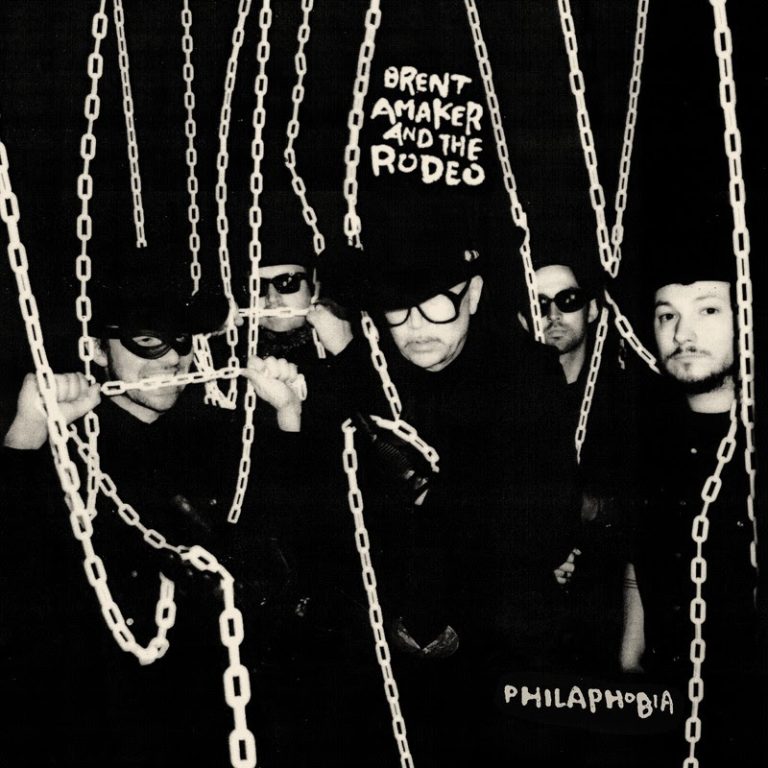When we last heard from Brent Amaker it was some 10 years ago, and by all accounts he was going through something of a midlife crisis on record. With his accompanying band the Rodeo, Amaker started off making music that was somewhere between earnest country music and a pastiche of the genre. Dressed up in black garbs and black cowboy hats (which they wear 24/7 when the band are on tour) and hailing from Seattle, it’s hard to deny that Brent Amaker and the Rodeo live up to their name when the music starts playing.
They made three solid records of their music over five years, honing their style to the point where it became hard to discern if you weren’t just listening to some solid country music instead of some performative take on it. (“We’re not really playing country music, but we’re playing cowboy music. ‘Western performance art’ is what I like to say,” their leader explains.) Amaker disappeared after 2014’s Android Amaker, a foray into electronic music concerning itself with AI uprising, space outposts, and warp drives. The spirit of Amaker’s cowboy music was hiding in all the cheesy storytelling, but by all accounts it was a strange Judas moment/genre diversion that felt like a cry for help.
Since then Amaker has been through his own personal troubles, namely divorcing his second wife a few years back. That experience feeds into the heart of the band’s new album (and first in 10 years), Philaphobia. With a title that translates into a fear of feminine love, Amaker is the lovelorn sad sack on his new record. “It’s been a while since I could see the light,” he remarks at one point, while on final track “Wanted” he tries to paint himself as the sullen, moody lost cause who is impossible to love, when in fact he’s middle range terrible, guilty of unremarkable shitty behaviour (“lying all the time… crushing childhood dreams”).
But there’s tenderness here too. “Audrianna” is a sweet ode to being madly in love while trying to play it cool, ”Los Angeles” has him reckoning with finally moving on (“Today we barely spoke / But I know it’s the right thing to do”), and “Climb Aboard” looks to the future by acknowledging you have to embrace the day you have in front of you. Amaker might be trying to keep everyone at arm’s length, but revealing a little humanity shows that underneath the masculine facade there’s a man hurting, still reeling off the breakdown of his second marriage.
And a little vulnerability goes a long way in helping break up another dose of what is the usual fare for the most part. That’s not necessarily a bad thing though, as when the band are all hollering “yeehaw” and having a hell of a good time playing together, Philaphobia is unexpectedly easy to get caught up in, even if you’re not a country fan of any sort. “Crawdog Creek” with all its Kimya Dawson-like vocal melodies and wiry guitar solos surprisingly sweeps you along for the ride (or at least surprisingly so for a track about getting together in the back of a pickup truck). Meanwhile an unexpected cover of Devo’s “Gut Feeling” sticks out a little bit; lyrically it doesn’t quite match Amaker’s penmanship, coming off a little too whiny and cynical for even him, but the surrounding music turns the original into an unusually thrilling country rock workout for the band.
“I thought that I was dead / Finished everything / I put away my boots / I promised not to sing,” Amaker opens the album with, and it’s hard to tell if he’s hamming up the theatrical pathos or if a life without a cowboy crew really does feel like the end of the world. (How much you go for his schtick will decide which of those is the case.) Philaphobia is certainly easy to label as a return to form – it may be the Rodeo’s strongest effort to date – but it feels more accurately thought of as a return to work. Even when it’s not exactly adding anything new to the canon (“Take It By The Horns”, “It’s All On Me Tonight”), its brevity allows it to speed by from one jangle to the next, meaning a memorable moment (the mariachi blend on “Take My Heart”, the chirpy chorus of “Los Angeles”) is never far away.
Some time apart has definitely helped the band hone their aim and output while also helping them sound brawnier than before. With his weathered croon (think Johnny Cash meets Matt Berninger, with a shade of 60s Scott Walker here and there), Amaker is the star at the centre of it all, but the best work here is done by his supporting band. The Rodeo sound electric and inspired, guitar solos veering into rockier and even post-punk territories, all while retaining that essential country twang. Back on the regrettable Android Amaker, the lineup was minimal, but on Philaphobia it feels fleshed out and alive. It goes to show that surrounding yourself with the right people really does do wonders.

